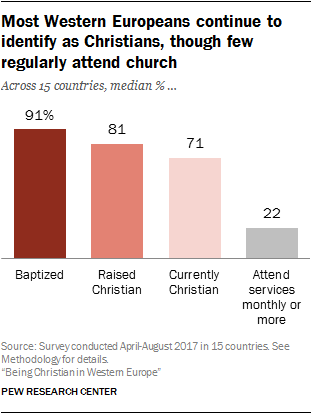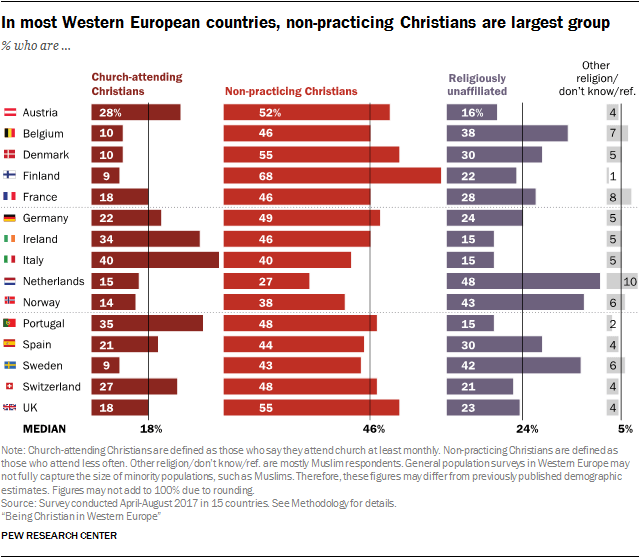
- You can find a PDF of the full report here. (168 pages)
- You can also find a Pew summary here.
Who Paid Pew to do this?
It is a poll funded by the Templeton Foundation, and that often sets alarm bells ringing. To quote their Wikipedia page …
Many scholars have raised concerns about the biased nature of the awards, research projects and publications backed by the Templeton Foundation.[3][4][5][6][7][8] According to the French National Center for Scientific Research, the Templeton Foundation has links with fundamentalistProtestantism, is openly creationist, and funds projects throughout the world whose aim is to unify science and religion, blurring the lines between the collective and the individual, the public and the private. According to the French Center, this type of private funding would be “disastrous for the autonomy of scientific research”.[9]
So is it biased or skewed?
Often Templeton “research” is, but in this case Pew ran the actual poll, and so I find that it is not.
So what did Pew Do?
In the summary of 2017 they conducted a telephone survey of about 1,500 people in each of the 15 Western European nations (UK, Ireland, Italy, Denmark, Germany, France, etc…). In total, 24,599 adult Europeans were interviewed.
Why were they doing this?
This is part of a larger effort by the Pew Research Center to understand religious change and its impact on societies around the world. They have previously conducted religion-focused surveys …
- across sub- Saharan Africa
- the Middle East-North Africa region and many other countries with large Muslim populations
- Latin America and the Caribbean
- Israel
- Central and Eastern Europe
What did they find via this latest Poll?
Most of the adults they surveyed consider themselves to be Christian, but most also don’t actually practise Christianity, and so right across all the European Nations, the largest group within each and every nation consisted of non-practising Christians …

Overall these things stood out as part of this non-practising Christian identity …
- They don’t believe in a God as described in the bible, but instead believe in a higher power
- They generally hold a positive view regarding churches and consider them to be beneficial to society
- They are more lightly to express a negative view of immigrants
- They tend to have a strong sense of national identity
- Interestingly enough, unlike the practising Christians, they favour legal abortion and also same-sex marriage
- The majority of them also said that they were bringing up their children as “Christian”
Here is an illustration of the results from across all 15 nations that enabled Pew to come to the above conclusions …
Education clearly plays a role …
- highly educated Europeans are generally more accepting of immigrants
- religious minorities, and religiously unaffiliated adults tend to have more years of schooling than non-practicing Christians
They did apply statistical techniques to control for these other factors such as education, age, gender, and also political identity. Even with that in place, it remains clear that there are three distinctly major demographics – practising Christian, the non-practising Christian, and the non-religious.
Differences between the US and Europe
What is similar is that the vast majority self-identify as “Christian” … about 71%. What that actually means however is very different.
In the US people are overall more religious than Western Europeans …
- Half of all Americans (53%) say religion is “very important” in their lives, compared with a median of just 11% of adults across Western Europe.
- Among Christians, the gap is even bigger – two-thirds of U.S. Christians (68%) say religion is very important to them, compared with a median of 14% of Christians in the 15 countries surveyed across Western Europe.
What is fascinating is that even American “nones” are more religious than their European counterparts …
- While one-in-eight unaffiliated U.S. adults (13%) say religion is very important in their lives, hardly any Western European “nones” (median of 1%) share that sentiment.
Similar patterns are seen on belief in God, attendance at religious services and prayer.
So the final punchline here is this – by some of these standard measures of religious commitment, American “nones” are as religious as or even more religious than Christians in several European countries, including France, Germany and the UK.
One Last thought
You might think that self-describing as “Christian” but not actually practising the belief at all would be unfamiliar within the US, but Trump is doing exactly that. Most can see that his stance is simply a convenient label he uses to con those that believe. The only people not seeing this are his religious supporters who adhere to him with a cult-like devotion and view him as their messiah.
